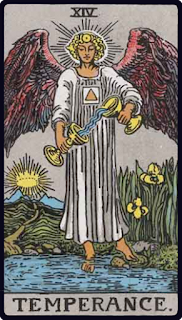
Representing benevolence, charity, patience, and training, the card of Temperance is once more concerned with the concept of balance. In contrast to the Justice card which left the wider Universe and divine will as responsible for achieving this balance, Temperance calls upon us as individuals to act and remedy the imbalances we perceive that are within our power to change. Temperance calls upon us to serve as tools of the Lord to act as a hand of God within the Earthly plane to serve as levers of power and influence that he may call upon to influence the Universe.
In the upright state Temperance asks us to observe the world around us and consider how we can make it better for others. This does not mean we have to give up our worldly possessions and all that we own in an effort to create equity but rather to serve as a net contributor of goodness to the Universe.
In the inverted state Temperance asks us to consider that which we take from the world and ask whether it is what we truly need or merely what we want and to understand the distinction between the two.
Understanding the distinction between want and need, and recognising when to place the needs of others before the wants of our own is part of achieving temperance within ourselves. This concept is exemplified by Reinhold Niebuhr’s Serenity Prayer:
"God, grant me the serenity to accept the things I cannot change,
courage to change the things I can,
and wisdom to know the difference”
- ‘The Serenity Prayer’ by Reinhold Niebuhr
In the Rider-Waite deck, the Archangel Cassiel is depicted, the second of the seven archangels to appear in the Major Arcana; Cassiel is the Angel of Temperance often referred to as the Angel of Tears. Cassiel holds in their hands two golden chalices and decants one into the other representing the divine will of heaven attempting to balance the suffering of humanity.
To the right of Cassiel can be seen two yellow irises growing among reeds which traditionally represent passion or unbounded emotion representing our need to balance our emotions and feelings against our desires; this is further reinforced by the presence of water representing the depth of the unconscious mind, and the land upon which the flowers grow representing the superficial nature of the conscious mind, with Cassiel standing astride with one foot present in each.
Finally, to the left a literal path to enlightenment is seen leading from the waters of the unconscious mind up through a mountain representing the struggle of life and the Sun representing illumination at the end of the path.
In self-reflection whilst ultimately Temperance echoes the Empress with similar themes common to both cards, the Empress emphasised the impact that we have on the wider environment and what we can do to benefit others, however Temperance can serve as another prompt to consider where we fit into that environment, this time focusing on the impact of our actions rather than the actions themselves.
Where the Empress asks “What can I do?” instead, Temperance asks “What impact did I have?” in an attempt to raise our awareness of how much influence we are having over those around us.
Patience is of particular note here with a focus on the energy we pass on to others and the time it may take for the impact of that energy to be felt. The concept of Temperance can be taken figuratively or reframed more concisely as a question to consider what emotional impact you are having on those around you and to consider whether you have been sufficiently patient with those around you in that context.
Ask yourself “Did I make things easier or harder for them?” or “When will this have an impact?”
